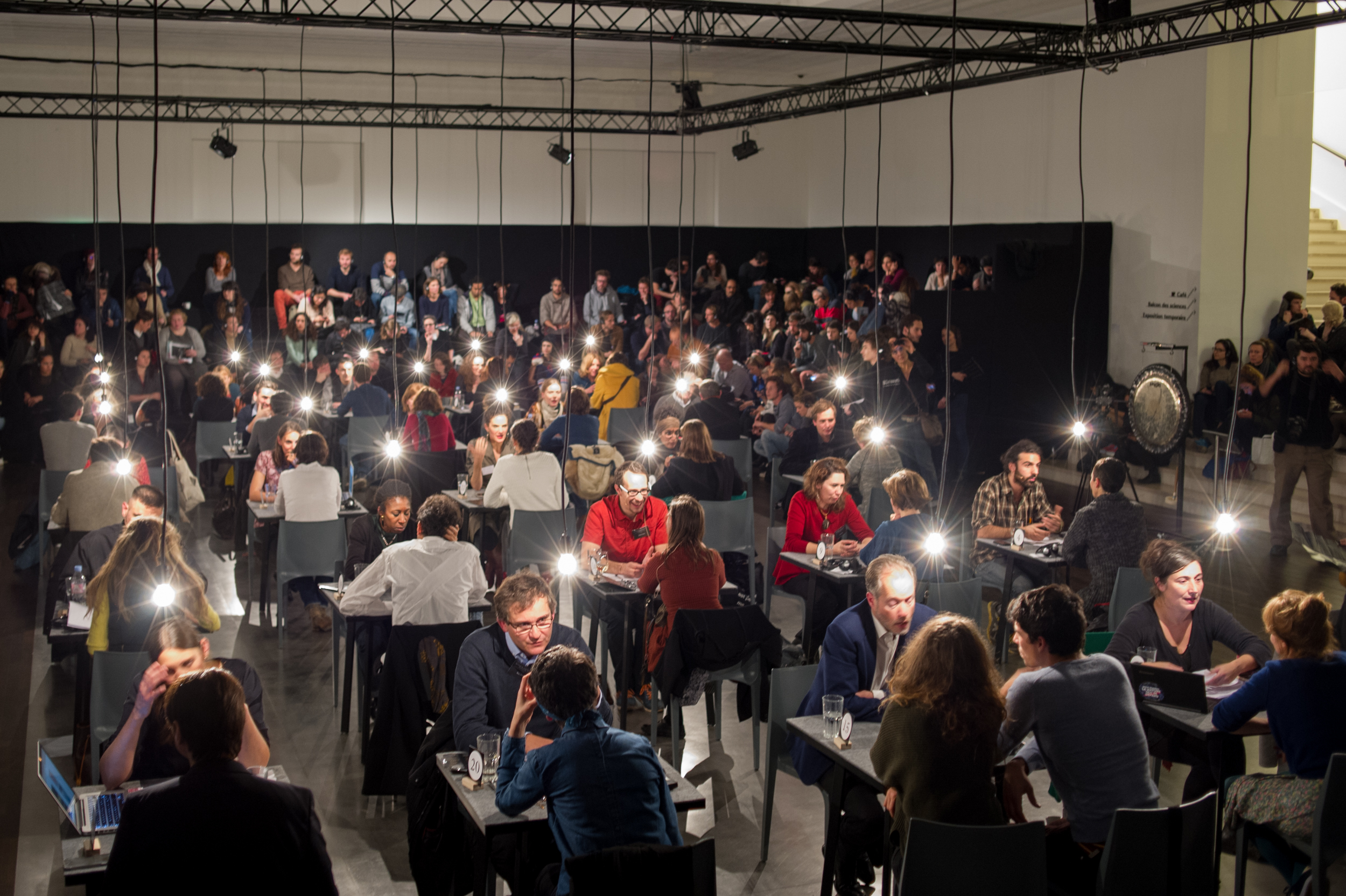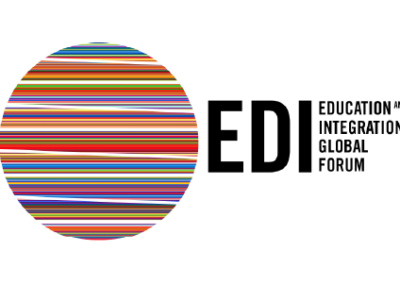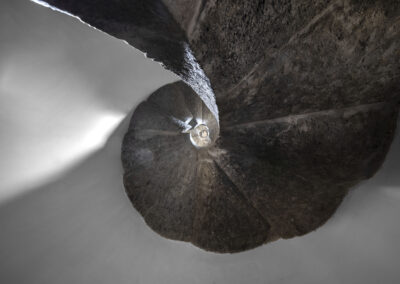For the Climate Change Conference (COP21) that took place in Paris in 2015, Council organised the 18th edition and the first Blackmarket for Useful Knowledge and Non-Knowledge in France, at the Musée de L’Homme. For a duration of four hours, 75 experts from different disciplines were gathered to exchange with members of the audience for a 30 minute conversation. Each of them gave a different account on how to live and think the Anthropocene.
Market for Useful Knowledge and Non-Knowledge is a concept initiated and developed by Hannah Hurtzig and Mobile Academy Berlin in which experts from diverse fields (natural scientists, craftsmen, artists, philosophers, and neighbours) partake in a series of parallel one-on-one dialogues with members from the audience. The audience (rather a customer on this evening) can book an expert and his or her offer of knowledge for half an hour. Learning and unlearning, knowledge and non-knowledge, and strategies of living and surviving change ownership in a non-institutional way.
ON BECOMING EARTHLINGS
The claim that we have entered a geo-historical era in which the global environment is predominantly influenced by human activities has become the challenge of our days. Yet, it is hardly understood. What does it mean to live in the anthropocene? Do we have to re-invent everything: humanness, technology, and nature, and, moreover, the relations between them? Are we even able to? And how is all this related to the overall understanding of our habitat, the earth?
Through the act of declaring the anthropocene, humanity – again – is put in the center of everything. That move has led to a lot of criticism, also regarding the aspect of responsibility and agency. There were calls to name it ‘Capitalocene’ or ‘Technocene’ instead. Or even ‘Chthulucene’ according to Donna Haraway, who suggests that eco-theory might be inspired by Chthulu, an ancient mythical power of the earth and its waters, soils, and skies. The renewed ‘anthropocentrism’ happens, though, to the price of a consequent shrinking. The age of man is not named thus, because ‘he’ has everything under control. Quite the contrary. Humankind as a species, so the lessons of the anthropocene teach us, has been determining the wheel of ‘geostory’ (Bruno Latour), i.e. geological history, the same way as isotopes and isotherms or carbon atoms: as an accumulation of an egregious multitude of single phenomena.
NEW PROPORTIONS
Living and thinking the anthropocene means to set humankind into new proportions. Anthropocene calls out for a practice of re-scaling and re-framing to establish other relations between humans and non-humans (and between humans and humans as well). We have to leave the humanistic scope of western thinking that has been taking over the rule of the world for the last roughly 500 years with its inherent strict fissures and hierarchies along the lines of ‘culture’ and ‘nature’, between humans (or to be more precise: men) and the rest. If ‘nature’ was the first colonized object of modern european thinking and conquering, then the concept of the anthropocene puts an epistemological end to colonizations of any kind. Anthropocene-thinking – to modulate a sentence by Eduardo Viveiros de Castro – is the theory and practice of permanent decolonization. There is no species, no life form, no being, as small and irrelevant as it may seem, towards which presumptuousness can be justified any longer.
Anthropocene-thinking tries to connect differently to the beings surrounding us and the environments we are living in, regardless if biological or technological. Who can teach us to become much smaller or much bigger? Small as swarm fish are, or microbes, or even molecules, in order to be able to contemplate and to commiserate, how climatological changes influence local behaviors and how these local changes retroactively have effects on their environments. Or large as clouds or geological dimensions of time, in order to be able to put ourselves in a concrete relationship with the geo-hydrological time of climate, the development time of fossil fuels, or the disintegration time of radioactive and other highly contaminated waste.
EXERCISES IN NON-HUMANNESS
Since we cannot know where this post-anthropocentrical stance will lead us, it is only possible to practically experience it. How does one exercise the anthropocene? One first step is a change of language. Whether we denote the interplay between the environment-formerly-referred-to-as-nature and the being-formerly-known-as-human ‘natureculture’, as Donna Haraway and others have done, or wether we use a completely different vocabulary, e.g. talking of ‘earthlings’ and ‘Gaia’, as Bruno Latour proposes, leaving the lingual and epistemological base of western thinking with its categorical separations between nature/culture and human/non-human, forces us on unknown territory. We can only get (out of) there step by step, relying on emergent practices and situated knowledges – exercises in post- or non-humanness: in change of perspective and scale, in decentration, in humbleness, or by acknowledging what Buddhist philosophy has been calling ‘interdependent co-arising’.
The Blackmarket invites specialists and activists from fields as diverse as climatology, artificial intelligence, biology, anthropology, ecofeminism, science fiction, performing and visual arts, integrated design, documentary film, agriculture and counterculture, shamanism, religion and other spiritual practices. Besides that, we want to draw attention to the imaginations of and for the earthlings that have always been little: many of the most classical children’s books published in the West deliver lessons in shrinking and expanding to perspectives much smaller and much bigger than human scale, from Lewis Carroll’s Alice in Wonderland, Selma Lagerlöf’s Nils Holgersson’s Wonderful Adventures, or Antoine de Saint-Exupéry’s The Little Prince, up to Michel Ocelot’s Kirikou.
In the chorus of the events orchestrating and amplifying the global climate conference COP21 in Paris in December, the Blackmarket for Useful Knowledge and Non-Knowledge will play a slightly different tone. In order to map the bio-geo-chemical as well as the imaginary state of things known and not (yet) known about the anthropocene, it offers experts and audience to take part in a series of one-on-one dialogues. It mirrors the places and discourses where world climate politics is made – and where the public is not invited – and gives another representation of ecological democracy. Experts and audience together create a multi-disciplinary, multi-dimensional, hallucinatory space of knowledge – invoking what might become the anthropocene.
Experts: Jamika Ajalon, Ingrid Amaro, Brook Andrew, Xavier Bailly, Mathieu Baudin, Irène Bellier, Judith Boon, Seloua Luste Boulbina, Isabelle Cambourakis, Silvia Casalino, Ewen Chardronnet, Joanne Clavel, Marcel Courthiade, Patrick Degeorges, Alain Della Negra and Kaori Kinoshita, Patrick De Wever, Vinciane Despret, Pierre Ducret, Rachel Easterman-Ulmann, Yona Friedman, Nadim Ghodbane, Fabien Giraud, Sophie Godin-Beekmann, Philippe Grandcolas, Sebastian Grevsmühl, Anahita Grisoni, Jean Paul Guevara, Émilie Hache, Florence Hachez-Leroy, Évelyne Heyer, Sophie Houdart, Liza Japelj Carone, Krõõt Juurak, Sonia Kéfi, Razmig Keucheyan, Nora Kravis, Sabrina Krief, Annick Labeca, Léopold Lambert, Annamaria Lammel, Catherine Larrère, Bruno Latour, Hervé Le Bras, Marie Lechner, Guillaume Lecointre, Guillaume Leterrier, Nathalie Magnan, Axel Meunier, Tarik Meziane, Yann Minh, Marie-Hélène Moncel, Yoann Moreau, Romain Nattier, Émilie Notéris, Martin Préaud, Heidi Quante, Philippe Rahm, Kalina Raskin, Marc-André Selosse, Ashkan Sepahvand, Maja Smrekar, Benjamin Steininger, Catitu Tayassu, Hugo Teave, Jennifer Teets, Sylvie Teveny, Vaia Tuuhia, Françoise Vergès, Stéphane Verlet-Bottéro, Paul Watson
A project by by Council | Concept by Hannah Hurtzig (Mobile Academy Berlin) | Curated by Alexander Klose, Nataša Petrešin-Bachelez | Curatorial Assistant: Laurens Otto | Scientific Advisor: Denis Couvet (Museum National d’Histoire Naturelle) | Artistic Coordination Sarah Lewis (Mobile Academy Berlin) | Commissioned by Council and Alexandra Cohen (Cuesta) | Executive Production Arter/Vivanto | Production Coordination Anne Becker and Julie Le Gall (bureau plato/KP) | With the participation of Muséum national d’histoire naturelle – Musée de l’Homme, Paris | Supported by La Région Ile-de-France, Le Bon Coin, Suez Environnement, The Nature Addicts Fund, La Ville de Paris, CNRS, Union européenne, Fonds FEDER-Interreg France-Suisse, Fondation de France, Slovenian embassy, Paris, Projet labellised COP 21







